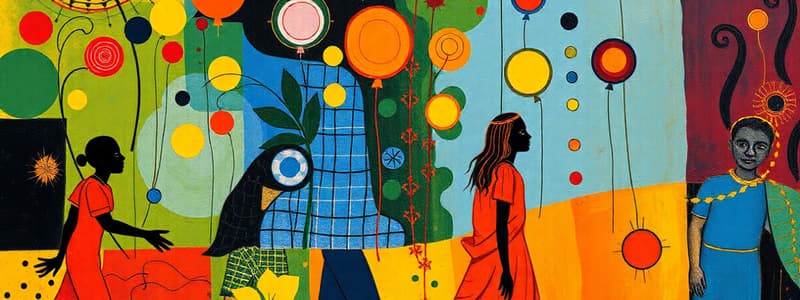Podcast
Questions and Answers
Ethnocentrism and Cultural Relativism are orientations related to forms of communication.
Ethnocentrism and Cultural Relativism are orientations related to forms of communication.
True (A)
The Neolithic Revolution refers to the transition from industrial societies back to hunting and gathering.
The Neolithic Revolution refers to the transition from industrial societies back to hunting and gathering.
False (B)
Cultural and sociopolitical evolution includes the progression from hunter-gatherer societies to post-industrial societies.
Cultural and sociopolitical evolution includes the progression from hunter-gatherer societies to post-industrial societies.
True (A)
Biological evolution in humans is only represented in the fossil record of Homo sapiens sapiens.
Biological evolution in humans is only represented in the fossil record of Homo sapiens sapiens.
Democratization refers to the process of establishing a state.
Democratization refers to the process of establishing a state.
Study Notes
Forms of Communication
- Ethnocentrism prioritizes one’s own cultural values over others, while cultural relativism emphasizes understanding cultures in their own contexts.
- Effective communication incorporates awareness of both ethnocentric biases and culturally relative perspectives.
Politics
- Politics encompasses governance, which includes public affairs and the necessity for compromise and consensus.
- Power dynamics play a crucial role in political interactions and decision-making processes.
Human Biocultural and Social Evolution
- Biological evolution tracks the transition from Homo habilis and earlier species to Homo sapiens sapiens, showcasing significant physiological development evident in the fossil record.
- Cultural evolution includes the progression from hunting and gathering societies to advanced agricultural, industrial, and post-industrial societies.
The Neolithic Revolution
- The Neolithic Revolution marked a transition to agriculture, leading to settled communities and the development of complex societies.
- This pivotal shift allowed for population growth and the formation of early civilizations.
Early Civilizations and the Rise of the State
- The emergence of early civilizations laid the groundwork for structured governance and the establishment of states.
- Factors contributing to state formation included agricultural surplus, social stratification, and the need for resource management.
Democratization
- Democratization refers to the transition towards more inclusive forms of governance, involving broader participation in political processes.
- This process often leads to increased rights and representation for various groups within society.
Cultural Adaptation and Evolution
- Culture plays a vital role in human adaptation, influencing social interactions and survival strategies.
- Ongoing cultural and sociopolitical evolution reflects humans' capacity to adapt to changing environments and societal needs.
Studying That Suits You
Use AI to generate personalized quizzes and flashcards to suit your learning preferences.
Description
Test your knowledge on the forms of communication and the concepts of ethnocentrism and cultural relativism. Explore the evolution of human society from biological and cultural perspectives, including the transition from early hominins to modern humans. This quiz challenges your understanding of politics, governance, and social evolution.




